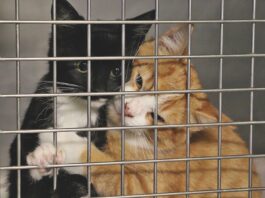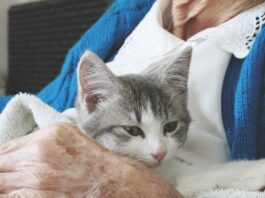How to Curb Destructive Scratching
Just days after youve invested in new furniture, your cat decides she really loves it, too. Its the place shes chosen to give herself a pedicure, and soon the arms of that beautiful new sofa look like theyve gone through a shredder. You may notice your cat flexing her nails when she first gets up and stretches or suddenly stop to sink her nails into the wall-to-wall carpeting as she crosses a room. She may scratch at the end of a burst of energy after playing with her favorite toy. Fabrics, carpet, wood, cardboard - there are numerous materials in your house that can soon become a target for your cats clawing.
Take Your Cat for a Walk!
Lucky, a striking gray tabby with bright green eyes, touches blades of grass, rolls around on the sunny deck and strolls over to sniff blackberry branches. Its all part of his regular walk around the fenced backyard with his human companion, who supervises his short outings. Since he is not particularly agile, his owner doesnt worry about quick escapes or even a leash. Buckys feline buddy, however, is a different matter. Jade, an agile black cat, loves the great outdoors as much as Bucky, but her athletic prowess easily has her up, up and away in a matter of seconds. Walking Jade outside requires an appropriate harness and leash. Whether you live with a Jade or a Bucky type, walking your cat will bear little resemblance to a conventional walk with the dog. Your cat probably will not like striding along at a brisk pace on a concrete sidewalk. That doesnt mean, however, that taking a walk with your cat isnt a great idea.
Using Automatic Feeders & Waterers
Susan McDaniels was having a problem getting her cat, Starfish, to drink enough water. Starfish ignored the bowls of fresh water that were strategically placed around the house, preferring instead to drink water from a drippy faucet. That’s when McDaniels had an idea. What if she could provide fresh, running water for Starfish all the time? “I thought it would be a novel idea to get an automatic waterer for my cat,” the Santa Barbara, California, resident remembers. “Nothing else was working.”McDaniels went online and purchased an electric waterer that doubled as an attractive fountain. Most importantly, her cat began to drink plenty of water. “Starfish finds the fountain to be very entertaining, and it helped with water consumption,” she says.
Ask Elizabeth: February 2012
Dear Elizabeth: Help! My cat Decker’s yowling is keeping me awake at night. I have become truly desperate for a good night’s sleep! - I can certainly sympathize with your need for sleep. Decker may be keeping you awake at night due to medical or behavioral reasons. Without more background information, I don’t know which is likely to be responsible in your case, so I’ll discuss several possibilities in the hopes that I hit upon the cause behind Decker’s insomnia. In the meantime, you should schedule an appointment with your veterinarian.
Short Takes: February 2012
In shelter and rescue situations, it is extremely important for personnel to identify the most adoptable animals whose adoptions are unlikely to be delayed for medical reasons. This study (“Risk factors for delays between intake and veterinary approval for adoption on medical grounds in shelter puppies and kittens,” in Preventive Veterinary Medicine, 2011) was designed to identify risk factors for health-related delays from intake to approval for adoption in shelter puppies and kittens.
Going Away? Plan for Your Pet’s Care
You have a wonderful vacation planned, a two-week escapade to a sunny island after a long year of hard work and stress. You’ve been looking forward to it for months, but a nagging problem remains: Who should take care of Tiger while you’re away? How to Decide. What you do with your cat when you take a vacation should depend on your cat’s personality, health condition, age and the resources available where you live. Hiring a pet sitter, kenneling your cat or boarding him with a veterinarian are all reasonable options for care when you aren’t home.
Going Away? Plan for Your Pets Care
You have a wonderful vacation planned, a two-week escapade to a sunny island after a long year of hard work and stress. You’ve been looking forward to it for months, but a nagging problem remains: Who should take care of Tiger while you’re away? How to Decide. What you do with your cat when you take a vacation should depend on your cat’s personality, health condition, age and the resources available where you live. Hiring a pet sitter, kenneling your cat or boarding him with a veterinarian are all reasonable options for care when you aren’t home.
Ask Elizabeth: January 2012
We adopted a new kitten from a local rescue group last month, and she is just perfect. Although she had been tested for the feline leukemia virus and FIV by the terrific group that saved her from the street, we took her to our veterinarian right away so that she could be examined before we introduced her to our two older cats. After a clean bill of health, we brought Bunny home, and she has become a well-integrated part of the family. The problem is that before we scheduled her spay surgery, she came into heat. What a scene!
Fire Safety Tips to Heed
It’s human nature to postpone preparing for a disaster, but it’s vitally important that you take time now to put a plan in place before a fire occurs. Start by installing smoke detectors throughout your home and make sure the batteries are functioning properly. Change the batteries twice a year or more frequently if the smoke detector “beeps” to warn you that battery power is low. Many people put in new batteries when they change their clocks for daylight savings time.
Ask Elizabeth: December 2011
Dear Elizabeth: I have a five-year-old indoor cat, Baby, with whom I’ve shared my home ever since she was born. I’ve never had any other companion animals, so it’s been just Baby and me for all that time. Here’s my problem: I recently became engaged and at some point in the near future will be moving into my fiance’s home. He has two cats — both females. One is just about Baby’s age and the other is probably about seven years old. Neither one of them is very friendly. Naturally, I’m concerned about moving Baby into this new environment. I’m afraid that the animals will fight and hurt each other. I’ll appreciate any advice on how I can best address this dilemma.
How to Protect Your Furniture
Several years ago, Susan Westerly took her cat, Delia, and moved in with her elderly grandmother — relieving some financial stress for Susan and allowing her grandmother to remain somewhat independent as her health declined. The old house was filled with beautiful antique furniture, and because Susan didn’t think she had any other options, she had Delia declawed. The cat eventually adjusted to life without her claws, but Susan felt very guilty.
Enjoying Hazard-Free Holidays
The holiday season is fast approaching, and your cat’s safety is probably the last thing on your mind — well behind preparing Thanksgiving dinner for your new in-laws and buying presents for Christmas or Chanukah. But it shouldn’t be. Probably the most important “gift” you can give your feline friend during these holidays is the pledge to remain alert about her whereabouts and well-being when your home is filled with guests, enticing foods, gift-wrapped goodies and new plants.














